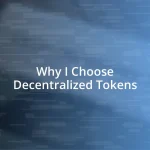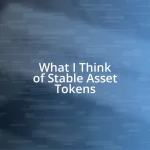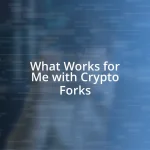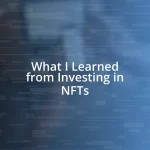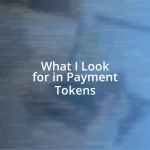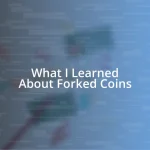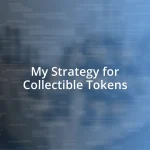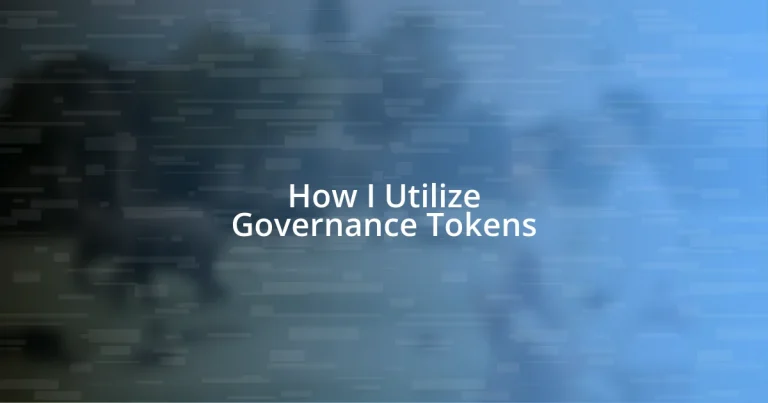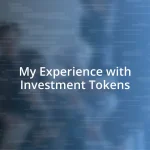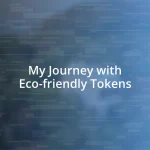Key takeaways:
- Governance tokens empower holders to participate actively in decision-making processes, fostering a sense of ownership and community engagement within decentralized ecosystems.
- Participation in governance promotes transparency and accountability, enhancing trust and allowing holders to make informed choices that align with their values.
- Different types of governance tokens, such as direct and delegated governance, offer various participation models, enabling users to engage based on their preferences and expertise.
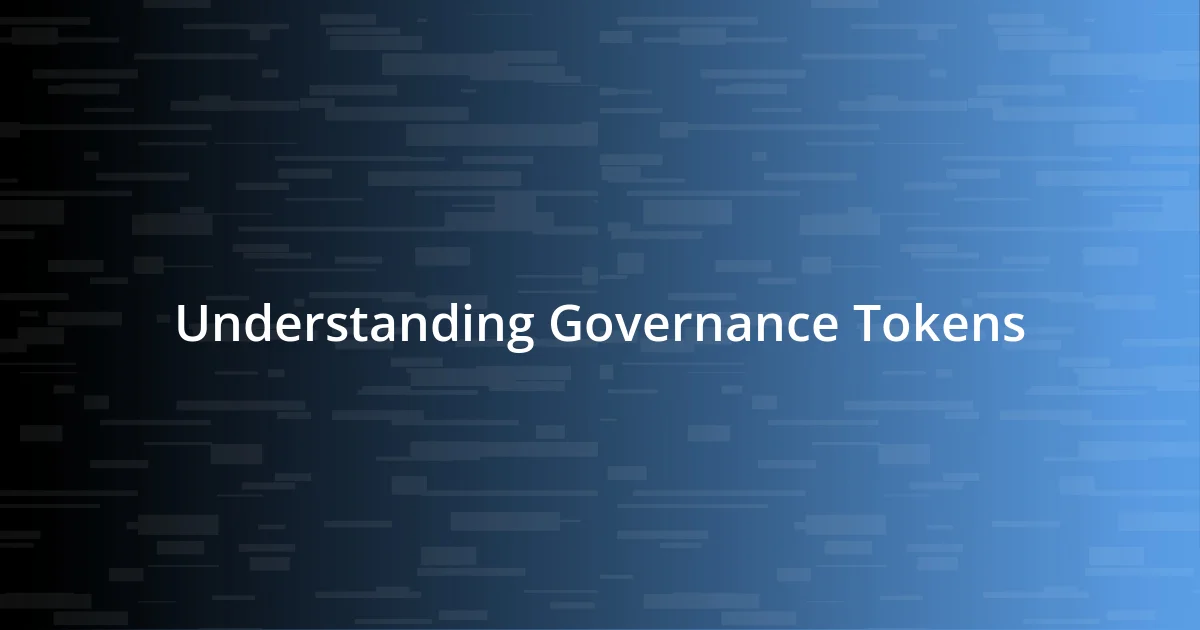
Understanding Governance Tokens
Governance tokens are fascinating tools that empower individuals within a decentralized ecosystem. They give holders the ability to influence decisions, like voting on proposals that can change the direction of a protocol. When I first encountered governance tokens, I was intrigued by the direct impact my vote could have—it’s almost like having a say in a community-driven project.
I remember participating in a governance vote for a protocol I believed in. The thrill of seeing my vote contribute to significant changes, such as fund allocation or feature development, left me with a sense of ownership and responsibility. It made me question, how often do we get such power in traditional systems? In many ways, governance tokens turn the tables, fostering a culture where every voice matters.
Understanding governance tokens also entails recognizing their role in fostering transparency and accountability. These tokens often come with mechanisms that prevent malicious activities, creating a safer environment for all participants. I often think about how this transparency feels like a breath of fresh air compared to the opaque decision-making processes we see elsewhere. It’s this blend of power and responsibility that makes governance tokens so compelling in the rapidly evolving landscape of blockchain technology.
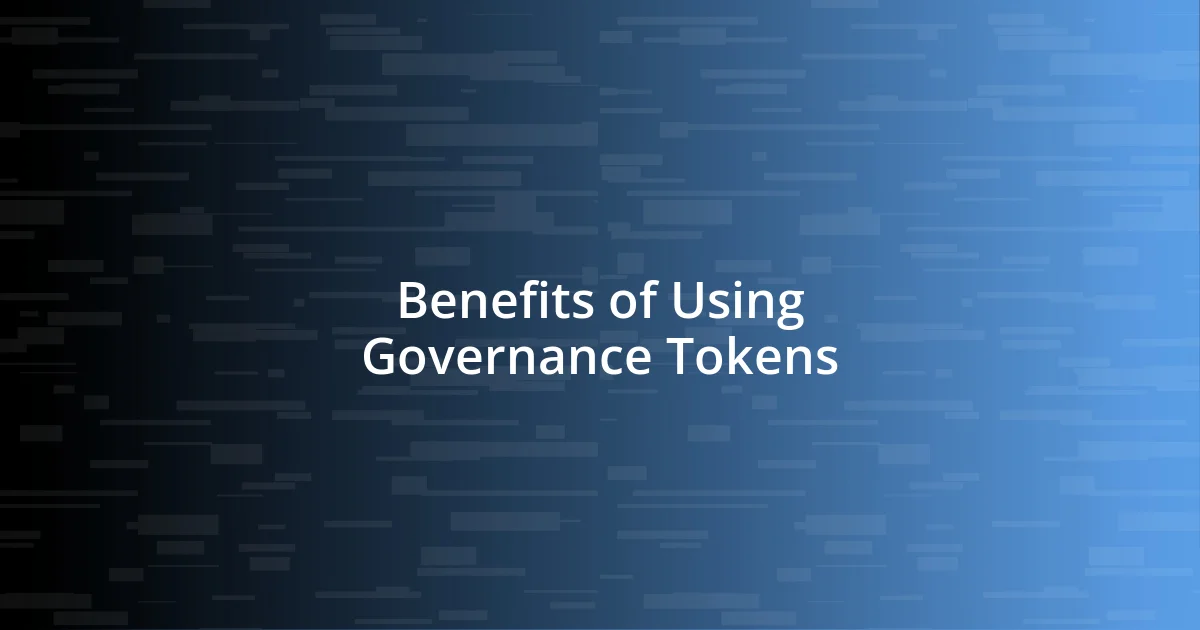
Benefits of Using Governance Tokens
Using governance tokens comes with several noteworthy benefits that enhance the overall experience for participants like myself. One major advantage is the empowerment it offers; holders are not just passive onlookers but active decision-makers in the ecosystem. The first time I participated in a critical vote, I felt a rush of excitement, knowing my input directly impacted the project’s trajectory. It’s exhilarating to realize that my opinion can shape the platform I use and trust.
Here’s a quick rundown of the benefits I’ve identified:
- Democratic Participation: Every holder gets a voice, fostering a sense of community.
- Increased Trust: Transparency in decision-making processes helps build confidence within the ecosystem.
- Direct Impact: Decisions made collectively lead to innovations and enhancements aligned with user needs.
- Incentivized Engagement: My involvement often comes with rewards, making participation even more appealing.
- Alignment of Interests: Governance tokens help ensure that the priorities of users align with the development direction of the ecosystem.
These aspects make governance tokens not just a transactional tool but an integral part of the community I engage with. In my experience, the ownership felt through voting nurtures a deeper commitment to the project and its values. When I vote, it’s not merely a choice; it’s a reflection of my beliefs and hopes for the future of the platform.
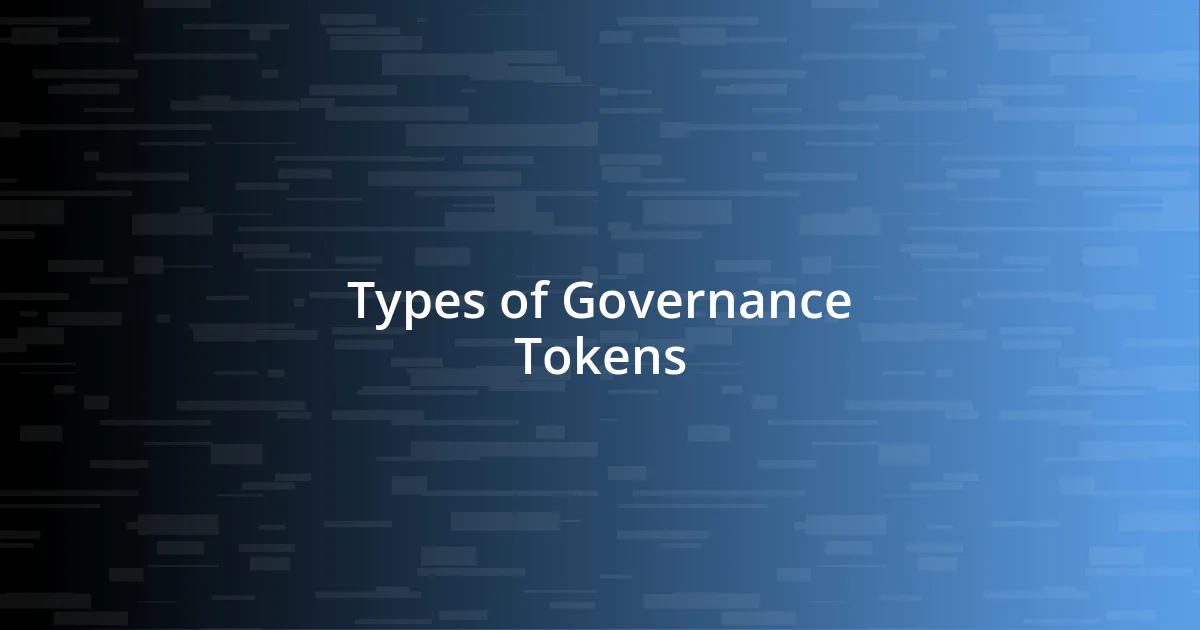
Types of Governance Tokens
Governance tokens come in various forms, each tailored to serve distinct roles in decentralized ecosystems. The most common types are direct governance tokens and delegated governance tokens. Direct governance allows token holders to vote on proposals directly, giving everyone a say. I’ve personally found this method invigorating; it feels like every decision is a group effort, where my vote isn’t just another drop in the ocean, but an essential part of the tide.
On the other hand, delegated governance tokens introduce a fascinating dynamic. This system lets holders delegate their voting rights to trusted representatives, creating a layer of expertise and insight. I remember encountering this concept in a specific protocol where I could select someone whose opinions resonated with me. This experience taught me that sometimes, it’s not just about the quantity of votes but the quality of decision-making that truly shapes a protocol’s future.
Finally, there are hybrid models that combine aspects of both types, providing flexibility for users to choose their level of engagement. I often think about how these hybrid systems can nurture a more tailored experience for the community. They allow individuals to participate without feeling overwhelmed, striking a balance between being active participants and relying on expertise when needed.
| Type of Governance Token | Description |
|---|---|
| Direct Governance Tokens | Holders vote directly on proposals to influence decision-making. |
| Delegated Governance Tokens | Holders can delegate their voting rights to trusted representatives. |
| Hybrid Governance Tokens | Combine direct and delegated voting features for flexible participation. |
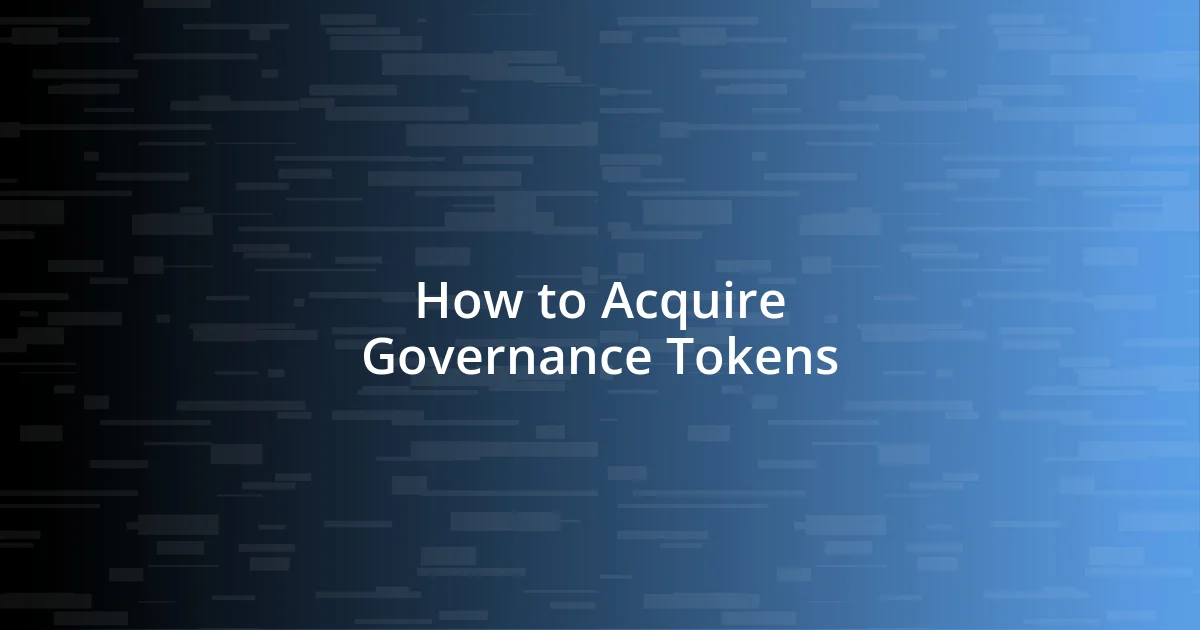
How to Acquire Governance Tokens
Acquiring governance tokens can be an exciting journey. One of the most common methods I use is purchasing them through decentralized exchanges. I recall my first transaction—there was a bit of a learning curve navigating the interface, but seeing the tokens transferred to my wallet felt rewarding. It’s like participating in a more dynamic trading experience where my decisions can directly affect the ecosystems I support.
Another way I’ve acquired governance tokens is through participation in initial coin offerings (ICOs) or token sales specific to projects I’m passionate about. What’s really engaging about this is knowing that my investment supports innovative ideas. When I participated in an early sale last summer, not only did I feel like I was getting in on the ground floor, but the excitement of being part of something from the start added to my appreciation for the tokens I hold.
Finally, I’ve discovered that earning governance tokens through participation in the ecosystem itself is incredibly fulfilling. Many platforms incentivize active users with tokens for staking or engaging in community events. I remember receiving tokens for providing feedback on a new feature; the feeling of being rewarded for my contributions was both validating and exhilarating. It’s empowering to know that my involvement not only earns me tokens but also aligns my interests with the growth of the ecosystem. Isn’t it fascinating how much more meaning these tokens embody when earned through active participation?
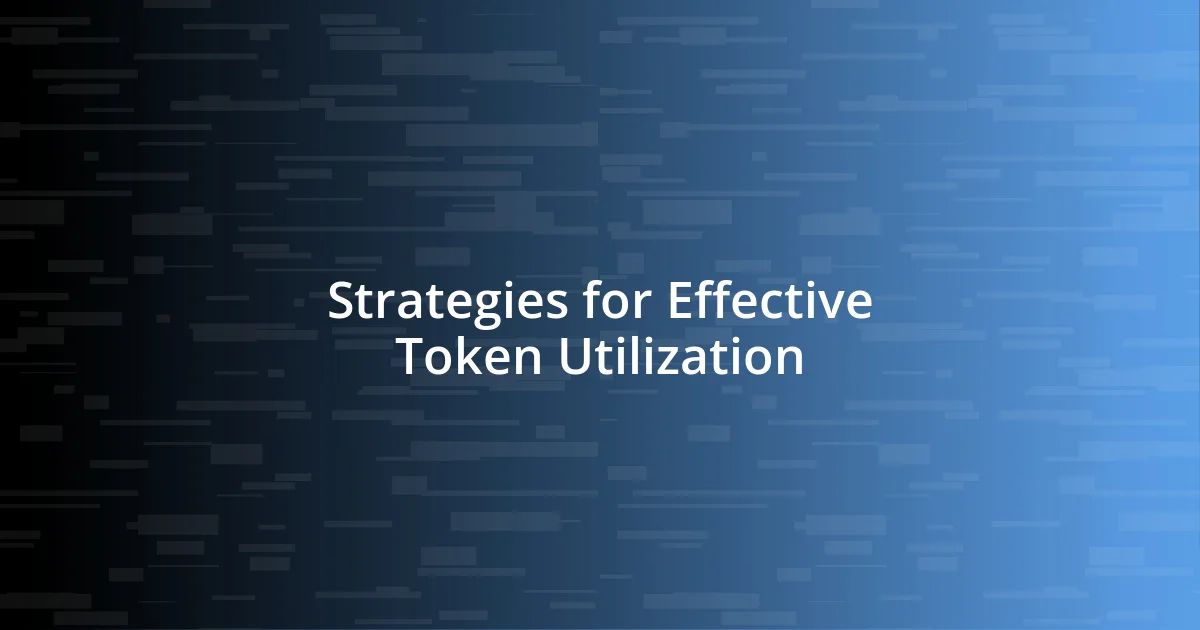
Strategies for Effective Token Utilization
Effective utilization of governance tokens hinges on informed participation and strategic decision-making. I’ve found that regularly engaging with community discussions can significantly enhance my ability to make sound voting choices. For instance, when I actively followed a project’s proposals and debates, it not only broadened my understanding but also helped me appreciate the nuances behind each decision. How often do we take the time to dive deep into discussions before casting our votes?
In addition, leveraging analytical tools to assess token performance and community sentiment has proven invaluable in my strategy. I recall a period when I analyzed governance token trends, which significantly influenced my voting preferences. This method allowed me to predict potential outcomes and align my votes with the community’s best interest. Isn’t it empowering to realize that informed voting can shape a project’s trajectory?
Another strategy I employ is collaborating with other token holders who share similar interests. Networking in forums has led to insightful exchanges, helping me refine my perspective before participating in governance. I distinctly remember a virtual meetup where we discussed the implications of a certain proposal, and it truly dawned on me how diverse opinions can lead to more holistic decisions. Engaging with others not only strengthens the community but also enriches my own understanding of the governance landscape. What if we all prioritized collaboration—wouldn’t that create a more robust decision-making environment?
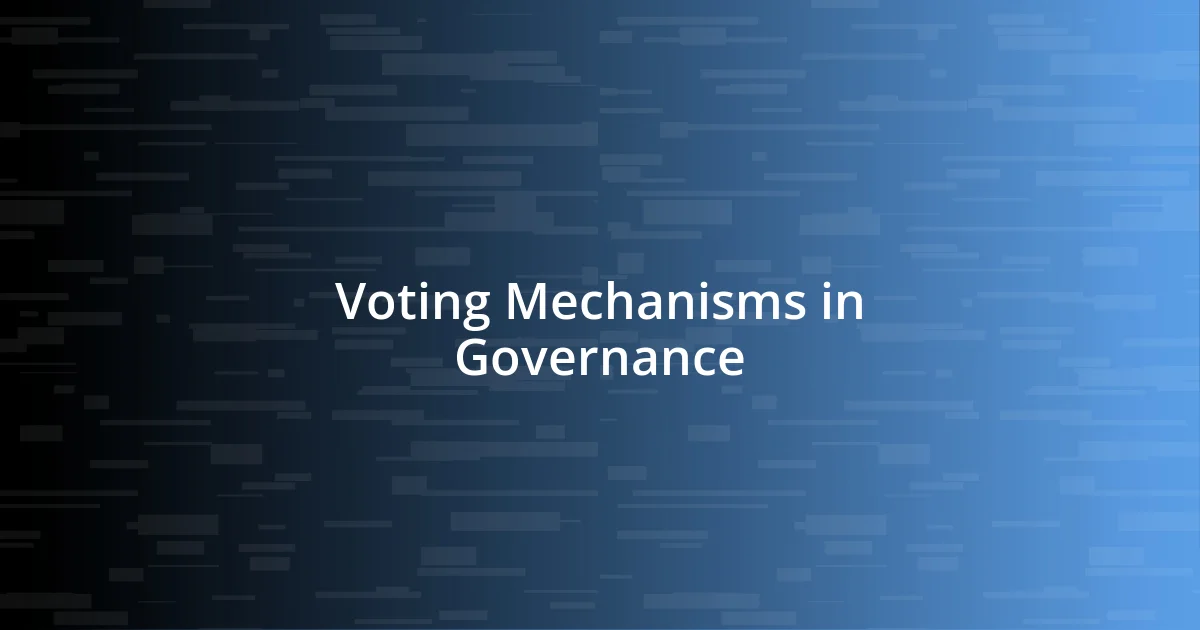
Voting Mechanisms in Governance
Voting mechanisms within governance tokens are fascinating because they directly empower us as stakeholders in a project. I remember casting my first vote and feeling a rush of responsibility—it was as if my voice truly mattered in shaping the project’s future. The diverse voting systems in use, like quadratic voting or liquid democracy, offer unique dynamics that can lead to more equitable decision-making. Isn’t it intriguing how different methods can alter the weight of our voices in governance?
With seasoned platforms implementing multi-signature wallets to secure votes, I feel a heightened sense of accountability. I once participated in a voting process where the need for a majority consensus sparked engaging conversations within the community. This level of transparency not only reinforced trust among us but also fostered a more proactive dialogue about the proposals at hand. How can we leverage such discussions to arrive at consensus-driven outcomes that reflect our collective interests?
Ultimately, the design of voting mechanisms can significantly impact the governance experience. I still recall a stressful moment when a crucial vote was on the line, and the community rallied together, which created an exhilarating sense of unity. This experience taught me that the mechanisms we choose profoundly shape our engagement and commitment. If we consider the implications of these mechanisms thoughtfully, how might they transform our governance landscape into one that’s more inclusive and participatory?
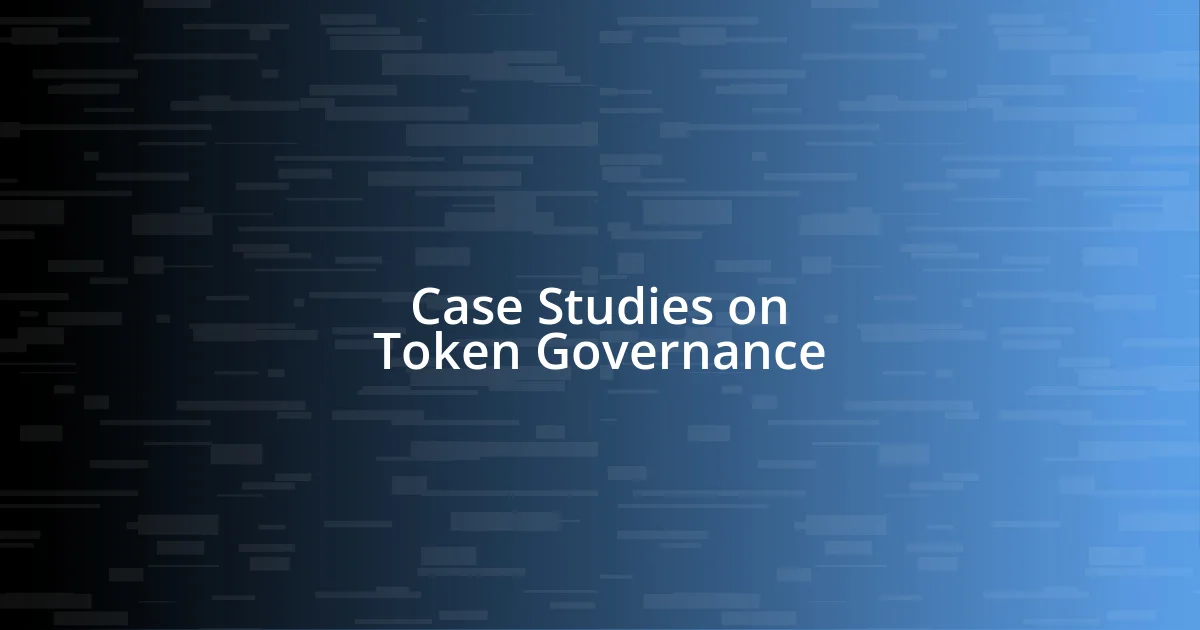
Case Studies on Token Governance
When examining case studies of token governance, one standout example is the MakerDAO ecosystem. I recall attending a community meeting where we discussed the implications of adjusting the stability fee—a crucial decision that impacts all MKR holders. The passion in that virtual space reminded me how governance tokens not only represent ownership but also foster a deep sense of community responsibility. How often do we as holders recognize the weight of our decisions in shaping the broader financial landscape?
Another interesting case involves the Compound protocol, where token holders regularly engage in discussions about interest rates. I remember a moment when a proposal to change the governance model sparked lively debates among my peers. The insight gained from those discussions made me appreciate the diverse perspectives within the community, highlighting how our collective wisdom can lead to more balanced and fair outcomes. Isn’t it amazing how our differing opinions can converge into a powerful decision-making force?
Finally, I’ve observed the year-long evolution of the Aave governance model, which incorporates community feedback to iterate on its processes. I can still visualize the intense dialogue surrounding a recent proposal aimed at creating a new liquidity market. Emotions were high, and it was a perfect example of how token governance can mirror real-world democratic processes. What does it say about us when the stakes feel personal enough to ignite such fervent discussions amongst token holders?

